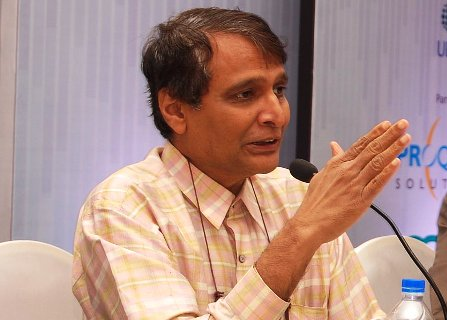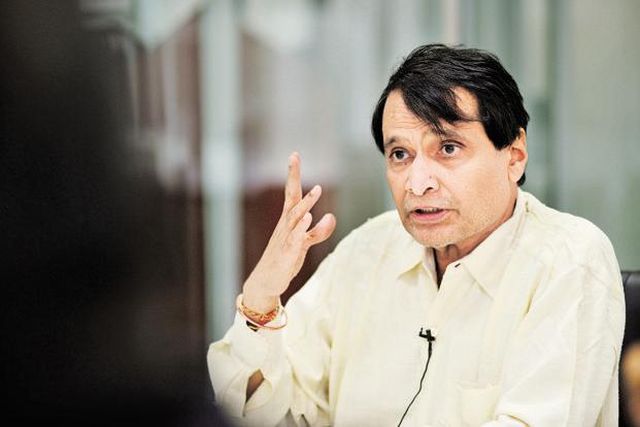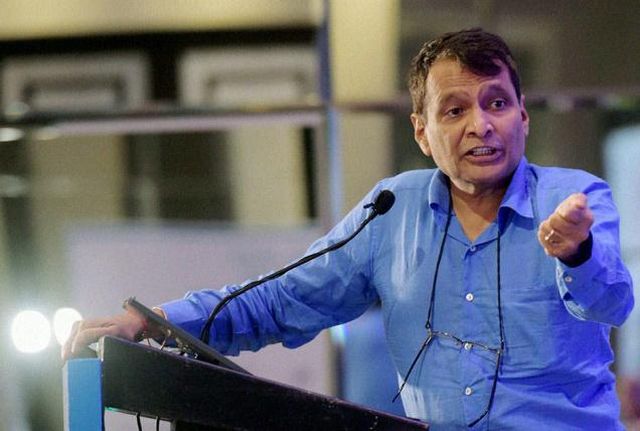
by admin | May 25, 2021 | Corporate, Corporate Governance, Investing, News, Politics

Suresh Prabhu
Chennai : Union Minister for Commerce and Industry and Civil Aviation Suresh Prabhu on Thursday said the Central government is proposing two schemes at the district level to attract investments.
Inaugurating the ACMEE 2018, the 13th International Machine Tools Exhibition here, Prabhu said an industry while investing in a state actually invests in a district.
Developing the district infrastructure and easing the administration process in district is also important, he said.
He said the Central government is proposing two schemes; one is ease of doing business at district level and the other is increasing the gross domestic product (GDP) of the district by 3 per cent more than the normal GDP.
According to him, the Central government is now working on a model project and once it succeeds, it will be implemented in every district across the country.
He said when industries invest in India, they invest in states like Tamil Nadu, so the State partnership with Centre gains importance.
—IANS

by admin | May 25, 2021 | News, Politics

Suresh Prabhu
New Delhi : The country’s new industrial policy which is at a draft stage will focus on ways to increase the share of manufacturing sector in the GDP, Commerce and Industry Minister Suresh Prabhu said on Friday.
Addressing the News18 Rising India Summit, he said that the draft of the new “Industrial Policy’s” is ready and the government will take the views of all the stakeholders.
According to the minister, India’s GDP has been growing largely due to the service sector, whereas agriculture sector is lagging behind due to structural issues.
Prabhu added that there is a need to make business easier for industry even at the district-level.
—IANS

by admin | May 25, 2021 | Corporate, Corporate Governance

Commerce Minister Suresh Prabhu
Guwahati : Commerce and Industry Minister Suresh Prabhu said a new industrial policy is being framed after 25 years and it is “being designed” to equip Indian industry for the future.
The minister spoke at an event organised here to commence the “nation-wide consultations with industry” on the proposed new policy.
According to Prabhu, the policy is being designed in a way that it will adequately adress the future needs of industry and that prior attempts in 1956 and 1991 were driven by “ideology” or formulated at a time of financial crisis.
The minister stressed “the laser focus of the government” to make business easier for industry.
In this regard, he highlighted multiple initiatives of the government to reduce the burden of regulations on industry. He also talked about the importance of Centre-state cooperation and the need for change even at the district-level.
The consultation event was organised by Department of Industrial Policy and Promotion in partnership with Ficci.
The event was attended by more than 120 industrialists from the Northeast, in addition to government officials from the region, Ficci said in a statement.
—IANS

by admin | May 25, 2021 | Business, Corporate, Corporate Governance, Economy, Finance, Investing, Large Enterprise, News, Politics

Suresh Prabhu
By Arun Kumar Das,
New Delhi : A government cannot run industry and regulation on businesses should be kept to a minimum to attract more foreign direct investment (FDI) and spur domestic financing, according to a minister.
Commerce and Industry Minister Suresh Prabhu said that a committee had been set up under the chairmanship of the Secretary, Department of Industrial Policy and Promotion, to look at regulatory issues.
“The ultimate idea is that regulation should not stifle the possibilities of investment. I get a sense now that people have again started looking at investments,” Prabhu told this correspondent in a freewheeling interview here ahead of his visit to Davos for the World Economic Forum’s (WEF) annual conference.
Prabhu also maintained that the government cannot run industry and a new industrial policy was in the works aimed at reducing regulations and promoting modernisation of existing industry. It will also seek to encourage new and emerging industries, even those which are not seen today.
The minister is slated to hold a series of bilateral meetings with his counterparts from many countries, including Australia and the UK, participating at the WEF in Davos, besides holding meetings with leading business leaders from around the globe in an attempt to attract more FDI into the country.
Taking note of India’s jump in the global “ease of doing business” rankings from 130th place to 100th, Prabhu said the government was in the process of initiating a number of measures, which might not have been captured in this particular ranking study. “In the next few years’ time, we will see it (the ranking) improving again and again,” he said.
Prabhu said the change in rankings was largely because of the introduction of the goods and services tax (GST) regime which was the single-largest and most significant reform post-Independence. It was also “a great positive” step in the direction of bringing transparency and greater reliability.
On the core focus areas for India to boost exports, he said the government was in the process of drawing up strategies across five main components — promotion of services, value-addition in goods, focus on agriculture, improving standards, and logistics.
“We have identified champion sectors with untapped potential for value-addition, employment generation and technology upgradation to promote services. Focus will be on improving the ease of doing business across these sectors,” he said.
India, he said, was poised to become the third-largest economy in the world and the onward journey of becoming a $5 trillion economy was “inevitable and unstoppable”.
“Today, global output is higher than the global trade. We need to re-strategise our global trade. India’s journey towards achieving $5 trillion economy sooner is not possible without expansion of our basket of global trade,” Prabhu said.
Envisaging a new high in India’s economic scenario, he said: “If we grow by more than eight per cent we will reach there in the next 6-7 years; if we grow by today’s pace of around 7 per cent we will reach there in 1-2 years more.”
Asked about the steps being taken to reduce India’s logistics costs, Prabhu said earlier there was no dedicated team dealing with logistics, but Prime Minister Narendra Modi had taken the decision to create a separate logistics division within the Ministry of Commerce and Industry.
He said steps were being undertaken to create a digital logistics platform for the industry to increase the speed of movement of goods and reduce costs.
“If a consignment is to be transported from, say, Mumbai to Kolkata, why not part-use rail and part-use road? But the right decision can be made only when we know the exact cost and time taken. A digital platform can make that happen,” he said.
Dwelling on the strategy to boost the “Make In India” initiative, he said it will be successful only if it happens at the state and district levels.
As Railway Minister Prabhu had undertaken a programme of developing a joint tourism circuit on the western coast of India, including the Konkan and Goa regions.
Now as the Minister for Commerce and Industry, he wants to take the Make-in-India concept to the Konkan.
(Arun Kumar Das is a senior freelance journalist. He can be contacted at akdas2005@gmail.com)
—IANS

by admin | May 25, 2021 | Business Summit, Corporate, Corporate finance, Corporate Governance, Economy, Events, News, Politics

Suresh Prabhu
New Delhi : India is expected to become a $5 trillion economy in the next eight-nine years with the manufacturing sector alone contributing 20 per cent towards that, Union Commerce Minister Suresh Prabhu said on Wednesday.
“We are preparing a detailed plan towards achieving that. Experts are busy preparing the roadmap including all the sectors where manufacturing can be promoted. If manufacturing is digitised, it will create a huge opportunity for technology firms,” Prabhu said.
Speaking on the first day of the India Digital Summit organised by the Internet and Mobile Association of India (IAMAI) here, the minister said innnovation cannot be confined to geographical borders.
“In order to reach the $5 trillion economy, manufacturing will contrinute $1 trillion and services will contribute $3 trillion,” the minister told the gathering.
Prabhu said he was currently working on a strategy for international trade which will contribute $2 trillion to the economy, where the contribution can come both from manufacturing and services sectors.
Earlier in the day, Niti Aayog Chief Executive Amitabh Kant said that every Indian will have a smartphone in the next five years.
There were nearly 400 million smartphone users in the country, he said, adding this was a period of huge technology disruption in the country.
“Today, 85 per cent of the devices are still unconnected. Therefore, there is a huge opportunity in the Internet of Things (IoT) space. The opportunity would be in the range of $70 billion by 2025,” Kant told the gathering.
According to him, Artificial Intelligence (AI) alone will generate opportunity to the tune of $32 billion.
“Advanced robotics are already handling 25 per cent of the jobs. This will rise to 45 per cent in the coming years.
“India is already ranked globally as the most active Internet user globally on a monthly basis. Digital transaction will touch $100 trillion in the next 10 years,” he told the gathering.
With 99 per cent Aadhaar penetration and bank account opened under Jan Dhan Yojana, he said, the scope was immense for the Fin-Tech industry.
“As far as the start-up community goes, ‘Make in India’ initiative had brought in a paradigm change in the financial ecosystem. While we have 4,000 start-ups, it will go up to 12,000 by 2020,” Kant said, adding that about 600 start-ups were there in the FinTech sector which will become a $14 billion opportunity by 2020.
The challenges today for the country were to provide safe drinking water, create infrastructure and build flyovers. All these give unicorns a unique opportunity to invest and explore, Kant said.
Telecom Secretary Aruna Sundararajan said that for IoT to happen, we need to have a robust 4G ecosystem in the country.
“I am hopeful that by the end of this year, we will have a pan-India 4G network availability,” Sundararajan told the audience.
She mentioned that the government has constituted a task force for rolling out the 5G network in the country.
The taskforce will come out with a roadmap soon, she said, adding that the Department of Telecommunications is keen on partnering with key telecom providers in the roll-out stage.
Delivering the inaugural address, Rajan Anandan, Chairman, IAMAI, and Vice President, Google India and South-East Asia, said these are exciting times for the Internet adoption in the country.
“Availability of very low-cost yet high-speed mobile Internet connection in 2017 has moved a slow-speed nation to a high-speed nation,” Anandan noted.
—IANS



